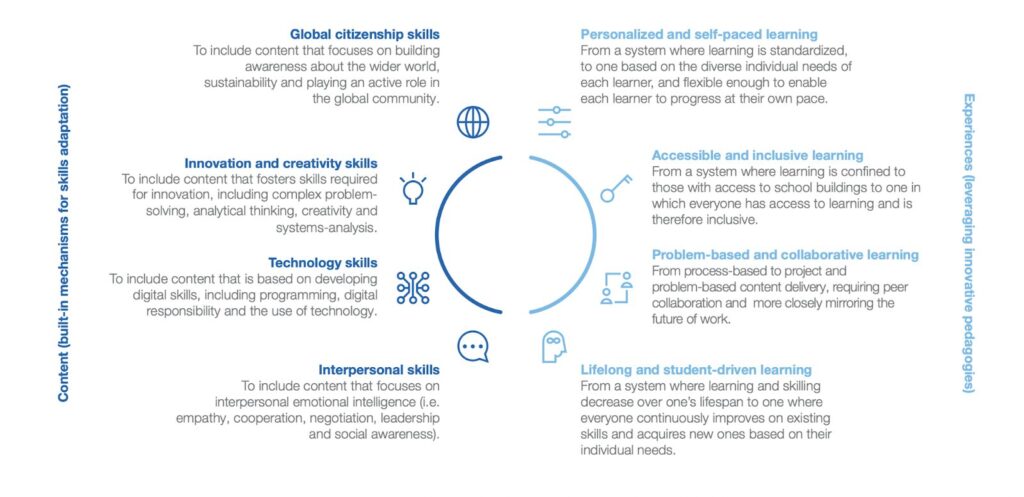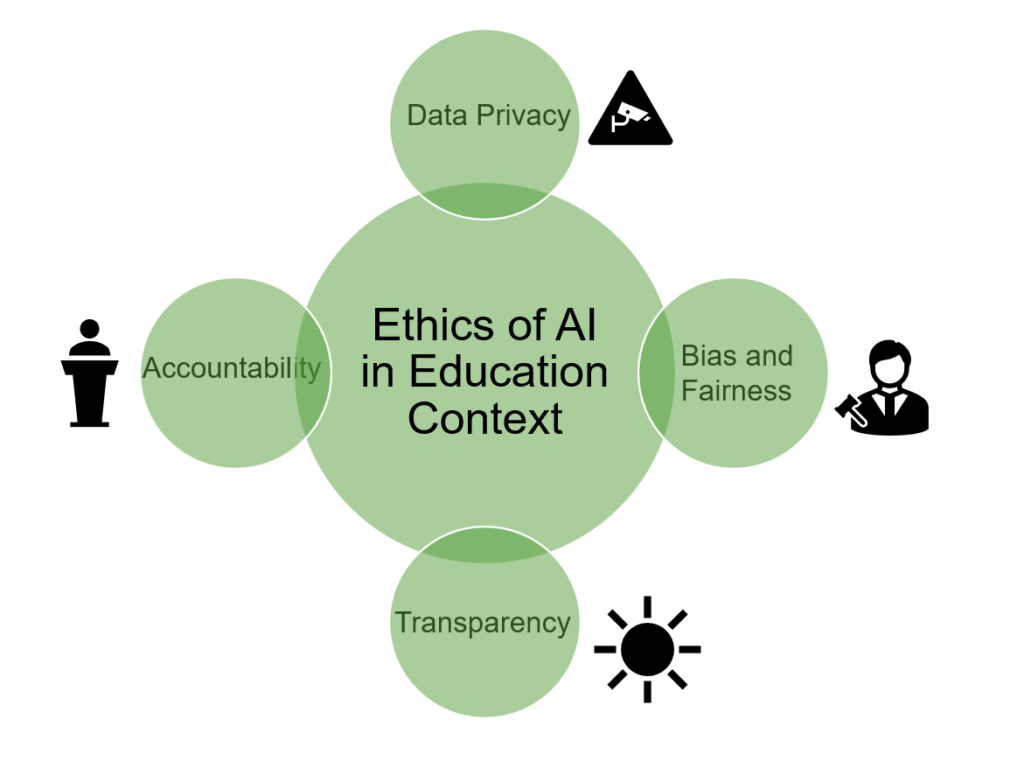Artificial intelligence (AI) is no longer a futuristic concept, but a powerful tool reshaping education, offering personalized learning and improved outcomes. This aligns perfectly with the Education 4.0 Framework, which aims to transform education for the Fourth Industrial Revolution. By strategically implementing AI, we can directly contribute to realizing this vision, ensuring learners are prepared for the future.
Let’s learn more about how AI is shaping Education with WeCloudData!
Artificial Intelligence in Education
AI can revolutionize education by increasing accessibility, efficiency, and personalization of learning. It can assist in addressing some of the most significant issues facing the education industry, such as teacher shortages, accessibility barriers, and learning gaps. However, the rapid expansion of AI technologies also raises ethical, regulatory, and equity concerns, which must be addressed to ensure fair access and responsible use.
Recognizing these challenges, UNESCO advocates for a human-centered approach to AI (“AI for All”) in education, ensuring that AI promotes inclusion and equity rather than widening already-existing gaps in education. UNESCO also published AI competency frameworks for students and teachers to guide countries in supporting students and teachers to understand the potential as well as the risks of AI.

Achieving success with AI in education
While UNESCO emphasizes the ethical and inclusive use of AI in education, research from the Education 4.0 Alliance (Shaping the Future of Learning: The Role of AI in Education 4.0) highlights four key areas where AI can drive meaningful change in learning environments.
1. Enhancing Teaching Through AI Augmentation & Automation
AI can help by automating administrative tasks, giving teachers more time and energy for meaningful student interaction, hence promoting human-centric teaching. However, teaching is more than just sharing information; the role of AI must be to augment, not replace teachers.
2. Improving Assessment & Learning Analytics
Assessments powered by AI offer real-time insights into student performance, enabling teachers to identify learning patterns and provide personalized feedback quickly. AI can automate grading and improve assessment of non-standardized tests, making assessments more data-driven and efficient.
3. Building AI & Digital Literacy
With digital skills becoming essential, many education systems struggle to prepare students for a workforce driven by artificial intelligence. AI-based learning promotes critical thinking, problem-solving, and creativity, allowing students to acquire the digital literacy necessary for future professions. AI integration in education, through traditional or innovative methods, is essential to forming the workforce of the future.
4. Personalizing Learning for Better Outcomes
Studies show that personalized tutoring greatly improves learning outcomes, but providing one-on-one instruction is costly. AI fills the gap by personalizing learning experiences, allowing for individual student needs, and assisting neurodiverse students with flexible interfaces.
Through the intentional adoption of AI, education systems can drive better learning experiences, equip students for careers of the future, and help build more inclusive and efficient classrooms.

How is AI Being Used in Education?
AI is now an integral component of education, assisting institutions, teachers, and students in making the most of their educational experiences. Here are a few examples of how AI is revolutionizing the world of education.
AI in Early Childhood Education
Artificial intelligence tools are increasingly being used in the field of early childhood education to enhance learning and development among young children. Through interactive experiences, AI-powered educational games, chatbots, and voice assistants support the cognitive and linguistic development of young minds.
AI Use Case Examples:
- Miko 3: An AI robot for interactive learning for kids.
- ABCmouse: Features hundreds of fun and interactive games, each designed to teach a specific educational concept, like teaching the alphabet and numbers.
AI-Based Tutoring Systems
AI-based intelligent tutoring systems provide students with immediate feedback and guidance,
as well as help teachers identify areas where students need extra support. Adaptive learning is a form of AI technology that adjusts to the student’s learning style, pace, and progress.
AI Use Case Examples:
- Cognii: Cognii is a Virtual Learning Assistant. It uses powerful AI technologies for automatic tutoring.
- Duolingo: AI-assisted language learning
- Socratic: AI-powered homework assistance developed by Google
AI-Powered Virtual Classrooms
By using AI-powered virtual classrooms, students become part of interactive learning experiences from anywhere. Chatbots & virtual assistants powered by artificial intelligence ensure 24/7 academic support, positively impacting students’ progress.
AI Use Cases Example:
AI for Career Counseling and Skill Development
AI-driven career counseling tools evaluate students’ interests and abilities to provide individualized study plans and career pathways.
AI Use Case Examples:
- LinkedIn Learning: AI-powered professional skill development
- Pymetrics: AI-powered career evaluation
AI-Driven Virtual Reality (VR) Learning
Virtual reality (VR) powered by AI Learning and VR simulations will improve hands-on scientific, engineering, and medical education.
AI Use Case Examples:
- ClassVR: Immersion learning driven by AI. ClassVR can be used in seminars or classes for students to visualise historic places, three-dimensional objects, or complex structures, such as molecules.
- Google Expeditions: Google Expeditions is a virtual reality teaching tool that offers virtual field trips
Challenges and Ethical Concerns of AI in Education
The adoption of AI in education is accelerating, reshaping learning experiences worldwide. AI-powered tools enhance engagement, personalize learning, and optimize teaching strategies. However, certain ethical concerns and challenges must be addressed.
Data Security & Privacy: AI uses a lot of student data; there are questions regarding who has authority over it, how it is stored, and whether it could be misused. It is important to have robust data protection rules.
Bias & Fairness: AI models can inherit biases from training data, potentially favoring certain student groups and reinforcing existing inequalities in education.
Rise of AI-Generated Content: Students are increasingly using ChatGPT and Grammarly to help with homework, research, and content production. These tools raise questions regarding academic integrity, even if they can improve efficiency and learning.
Teacher-Student Relationship: Even though AI can automate jobs, it cannot take the place of social learning, emotional support, and human interaction that teachers bring. Over-reliance on AI may weaken classroom relationships.
Accessibility & Equity: AI can help students with disabilities or in remote places by personalizing their education. However, unequal access to technology and infrastructure is increasing educational inequalities.
Regulation & Policy: To balance innovation and student protection, clear AI policies are required to handle data privacy, transparency, and fairness.

The future of education lies in responsible AI adoption, where technology augments, not replaces, human educators. By implementing clear policies, ethical AI usage guidelines, and interdisciplinary collaboration, educational institutions can harness AI’s full potential while upholding fairness, transparency, and academic integrity. The key is to strike a balance between innovation and ethical responsibility, ensuring that students, educators, and policymakers work together to create an AI-powered future that benefits all.
Unlock the Power of AI in Education with WeCloudData!
At WeCloudData, we are committed to bridging the gap between AI and education by offering cutting-edge AI training programs, data science bootcamps, computer vision bootcamps, natural language processing, and machine learning courses. Whether you’re an educator looking to integrate AI into teaching or a student eager to develop AI skills, WeCloudData provides expert-led courses to help you navigate the future of AI in education.
Explore AI-driven learning solutions today!
Visit WeCloudData to start your journey into AI-powered education.

